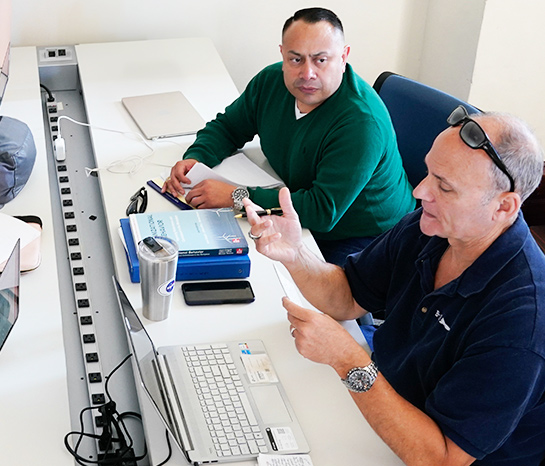Online MS in Business Analytics

Get started on your Journey
The Our Lady of the Lake University School of Business and Leadership (SBL) offers an online Master of Science Degree in Business Analytics, a program tailored for working professionals seeking to enhance their skills at the intersection of business strategy and data science.
The MS in Business Analytics aims to equip graduates with advanced proficiency to tackle complex challenges in both public and private sector organizations. Through a blend of theoretical understanding and hands-on experience, students gain insights into cutting-edge data analytics techniques crucial for informed decision-making.
The program focuses on:
- Economics/Finance
- Information Management
- Statistics
- Operations Research
The online program design allows for maximum flexibility to balance work, family and school. The 30-credit-hour program can be completed in less than two years.
Master of Science in Business Analytics
Program Overview
The field of Business Analytics touches all industries and will continue to grow as access to big data continues to expand. Individuals with the skills and knowledge to analyze that data will be in high demand. They will be able to assist businesses and organizations with making strategic, data-driven decisions.
OLLU’s Master of Science in Business Analytics program will provide you with a comprehensive foundation in the mathematical topics required for learning quantitative finance, business analytics and data science. The program also introduces you to practical forecasting, database construction and evaluation.
Designed for working professionals who do not want to pause their career while building their skills and knowledge, the program offers:
- Maximum flexibility through online, asynchronous classes
- Small classes allowing faculty to provide direct guidance to help students reach their business goals
- A 10-course, 30 credit-hour program that can be completed in less than two years.

Accreditation
This business program is accredited by the Accreditation Council for Business Schools and Programs (ACBSP). ACBSP is a leading specialized accreditation association for business education, supporting, celebrating and rewarding excellence on a diverse global scale.
Program Benefits
Finish in under 2 years
Online for maximum flexibility
No GRE/GMAT required
What is a MSBA degree?
A Master of Science in Business Analytics (MSBA) degree is a specialized program designed to equip students with the skills and knowledge necessary to analyze complex business data and make strategic decisions based on insights gleaned from data analysis.
It combines business, statistics, and computer science principles to provide students with a comprehensive understanding of leveraging data to drive organizational success.

What Will I Learn in a Master's in Business Analytics Program?
In a Master's in Business Analytics program, students undergo rigorous training in essential quantitative and analytical skills crucial for thriving in today's data-driven business landscape.
Throughout the program, students gain proficiency in advanced mathematical concepts such as calculus, linear algebra, probability, and statistics, providing a solid foundation for analyzing complex business data.
Additionally, they develop expertise in programming languages like Python for statistical applications, enabling them to manipulate and analyze large datasets efficiently.
Furthermore, the curriculum delves into specialized areas such as pricing strategies and marketing analytics, empowering students to make informed decisions based on microeconomic principles and competitive market analysis.
Overall, the program fosters a comprehensive skill set, blending mathematical prowess, programming fluency, and business acumen to prepare graduates for leadership roles in the dynamic field of business analytics.
Is a Master of Science in Business Analytics Worth It?
Absolutely! Pursuing an Online Master's in Business Analytics offers numerous advantages and opportunities for personal and professional growth. With the increasing importance of data-driven decision-making in today's business landscape, individuals with expertise in business analytics are in high demand across various industries.
An online MSBA program provides flexibility and convenience, allowing students to balance their studies with work and other commitments.
Moreover, the skills and knowledge gained through an MSBA program are highly valued by employers, opening doors to lucrative career opportunities in fields such as data analysis, business intelligence, consulting, and strategic planning.
Courses in the MSBA Degree
Students in the Master of Science in Business Analytics program take 10, 3-credit-hour courses that can be completed in the fall, spring and summer semesters. The following are the courses in the program:
BUSA 8325 | 3 CREDIT HOURS
Provides students with a comprehensive background in the mathematical topics required for learning quantitative finance, business analytics, and data science. The mathematical topics covered include calculus, differential equations, linear algebra, and probability and statistics. Broad familiarity with linear algebra, statistics, stochastic process, finance, and economics is helpful but not required.
BUSA 8330 | 3 CREDIT HOURS
Provides an introduction into practical forecasting techniques. Students will acquire
in depth knowledge of database construction, estimation, forecasting and evaluation.
Employs the basic techniques of econometric modeling and time series analysis. Topics
are chosen from applied probability, sampling, estimation, hypothesis testing, and
multivariate statistics. Introduction to Python programming techniques and its statistical
applications.
BUSA 8335 | 3 CREDIT HOURS
Focuses on profit maximizing pricing strategies, through the employment of applied
microeconomic theory. Emphasis will be on the use of information that is readily available
at the firm level. This includes information on supply, demand, inventories, prices,
market structure, profitability, and the relative competitiveness of the firm. Utilizes
concepts from economics, finance, production, and operations management; thereby integrating
the concepts of microeconomics with those of industrial engineering.
BUSA 8337 | 3 CREDIT HOURS
Introduction to the quantitative techniques and algorithms that are based upon large scale datasets, and the optimization techniques widely utilized in the business sector. Prepares students for more rigorous analysis of large scale datasets, as well as introduces machine learning models and the data analytics that are most often employed in business intelligence. Machine learning and statistical methods (to included Bayesian analysis) are used throughout this course.
BUSA 8339 | 3 CREDIT HOURS
Introduction to dashboards and scorecards for presenting and analyzing critical performance and operational data. Developing such skills will provide students with the requisite knowledge/tools for translating business strategy into goals, objectives and indicators that are used as metrics in quantifying an organizations’ progress towards achieving its operational targets. Introduction to dashboard functionality, characteristics and components, key elements, design principles, security, standards and best practices.
BUSA 8340 | 3 CREDIT HOURS
Provides student with the opportunity to apply what they have learned about data-driven
business decision-making. Each student will frame a research project, by employing
the analytical tools and methods from which they have developed throughout the program.
The final capstone project will select from a cadre of possible scenarios which might
emphasize developing optimal marketing strategies, revenue maximizing decision making
and/or the development of strategies that maximize the efficient operations of a division
of a firm. Students will work with a faculty member to assist them in their final
project selection.
CISS 8302 | 3 CREDIT HOURS
Analysis, design and administration of databases using information systems development
methodologies and tools. Overview of SQL, data warehouses, distributed access, and
security.
ECON 8310 | 3 CREDIT HOURS
Utilizes the tools of microeconomic theory to analyze and understand the essential
topics that are related to optimal business decision making. Topics included focus
around the microeconomic factors which determine demand and profit maximizing pricing
behaviors. Market structures and various aspects of industrial organization and consumers’
behaviors are covered. Introduction to the concepts of econometric analysis, as it
is applied within a microeconomic context. Topics will be selected from health economics,
IT sector pricing, energy, and transportation.
FINC 8330 | 3 CREDIT HOURS
Covers the key quantitative methods that are employed in modern finance, such as financial
econometrics and statistical inferences. Emphasizes financial applications through
the use of dynamic optimization, Monte Carlo simulations, structured and unstructured
data, random effects models, fixed effects models and Bayesian techniques. Applications
in the areas of predictive analysis (trading), sentiment analysis, financial fraud,
credit rating, pricing and consumer segmentation will be explored. Includes guest
lectures from practitioners in the finance industry.
MKTG 8310 | 3 CREDIT HOURS
Prepares managers with the abilities to identify and to quantify competitive advantages
that emanate from leveraged analytics. Students will gain keen insight into frameworks
which enable them to address marketing strategies; and employ marketing analytics
in order to make data-driven decisions. Topics covered include quantifying consumer
value, preference measurements, attitudinal and behavioral market segmentation, consumer
targeting, product management and pricing. Emphasizes real-world applications that
involve frameworks, cases, short assignments and action learning exercises.
Admission Requirements
All candidates for admission to any graduate program must fulfill the following general admission requirements:
- An earned baccalaureate degree in a related discipline from a regionally accredited institution
- A grade point average of 2.50 for all undergraduate work or 3.00 for the last 60 semester hours of undergraduate work
- English proficiency: Applicants educated in a primary language other than English must present a TOEFL score of at least 550 on the paper test or 213 on the computer-based test, or 79 on the Internet-based test (iBT). Score reports cannot be more than two years old, and official score reports must be sent directly to OLLU from ETS. Contact international admissions at international@ollusa.edu for alternatives to the TOEFL.
In addition to the requirements for graduate admission to OLLU, applicants will provide:
- A personal statement detailing preparation to undertake the degree and reasons for wishing to study for the degree (no more than 500 words)
- Two references (university provides form) from persons knowledgeable about the applicant's professional and academic background
- A résumé highlighting managerial or professional work experience
After a review of the completed admissions files, selected applicants will be invited to a face-to-face or Skype interview with the program head and/or the committee that allows the applicant to share his/her passion for the field, accomplishments and enthusiasm for the school.
Application for Admission Deadlines
Deadlines for submitting a completed application for the Master of Science in Business
Analytics are as follows:
Priority deadline: March 1
Final deadline: June 1
Faculty
Full-time faculty members in the Business Department have extensive professional and academic experience. Most have doctoral degrees and/or professional certifications. Seasoned practitioners who teach selected courses complement full-time professors as adjunct faculty. View Business Faculty

What Can You Do With an online Master’s Degree in Business Analytics?
An online Master's Degree in Business Analytics equips students with the advanced skills necessary to thrive in the competitive job market. This specialized degree program is designed to prepare students for a wide range of in-demand careers where data-driven insights are crucial for business strategy and decision-making.
Here are some potential career options:
- Marketing Research Analyst
- Operations Research Analyst
- Data and Analytics Manager
- Financial and Budget Analyst
- Cost Estimator
- Statistician
Tuition & Financial Aid
The online Master of Science in Business Analytics prepares you for the in-demand career space where business strategy and data analysis intersect. The degree is an investment in your career and opens options across a variety of industries.
| Tuition | Costs |
|---|---|
| Our Tuition (2024–2025 rate) | $2,973 per course |
| Average Tuition of Peer Online Institutions | $4,330 per course |
| Average Total Tuition Cost | $29,730 |
You should begin the Financial Aid application process at the same time that you apply to the graduate program. To be considered for financial aid, you must complete the Free Application for Federal Student Aid (FAFSA) at www.studentaid.gov . Please list Our Lady of the Lake University, federal school code #003598, as one of the schools to receive your application information. OLLU will receive your results electronically and use them to award your financial aid.
Please note: You must be officially accepted for admission to the university before a financial aid award can be processed.
FAQs
A Master's Degree in Business Analytics is an advanced academic program that teaches students how to analyze business data to drive strategic decision-making.
Individuals who have a strong background in mathematics, statistics, and computer science may benefit from this degree. It is particularly suitable for those looking to transition into roles such as Data Analyst, Business Intelligence Analyst, or Data Scientist within the business sector.
This degree equips students with the ability to collect, process, and interpret complex data sets using statistical tools. Graduates often find employment in industries such as finance, healthcare, marketing, and technology, where they can use analytics to inform business decisions and strategies.
